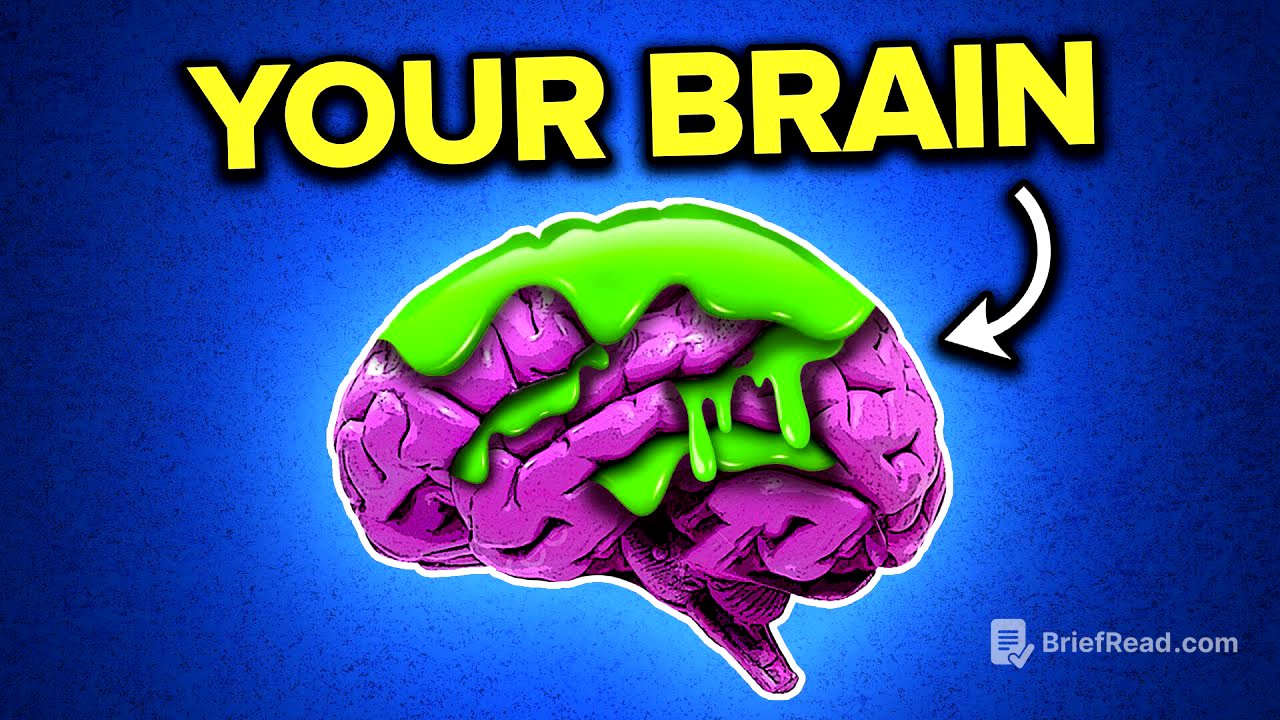TLDR;
This video discusses "brain rot," a state of cognitive decline characterised by lethargy, lack of focus, and demotivation. It differentiates brain rot from brain fog and mental illness, explaining it as a rusting of the mind due to disuse or negative external influences. The video uses the analogy of a physical infection to explain how negative thoughts infect, colonise, and lead to maladaptive responses in the mind. It provides a yogic approach to fixing brain rot by filtering perceptions, controlling mental colonisation, and addressing the ego.
- Brain rot is a deconditioning of the mind, not a medical condition.
- It's caused by unfiltered perceptions, negative mental colonisation, and ego-driven adaptations.
- Fixing it involves filtering perceptions, controlling sensory inputs, and challenging egotistical statements.
What is Brain Fog? [0:08]
The video addresses the issue of individuals experiencing cognitive difficulties such as lethargy, difficulty focusing, and a lack of motivation. When working as a psychiatrist, the speaker would try to diagnose the cause of these symptoms, considering physical and mental illnesses. Increasingly, the speaker noticed more and more cases of brain fog, a neuro-inflammatory condition causing cognitive problems, often seen in post-COVID-19 syndrome.
What is Brain Rot? [1:49]
The speaker identifies a third issue beyond mental illness and brain fog: brain rot. This occurs when individuals' minds have deteriorated from engaging in unproductive or negative activities over extended periods. The mind rusts from disuse or pollution from external negative influences. Medical training and treatments for conditions like brain fog are insufficient to address brain rot. Instead, the speaker draws on yogic training to "unrust" and optimise mental function, viewing yogis as individuals who overclock and functionally use their brains. The antidote to brain rot lies in this yogic approach.
Infection, Colonization, and Adaptation [3:23]
The speaker uses the analogy of a physical infection to explain brain rot. First, a barrier breaks down, allowing bacteria to invade. Second, the bacteria colonise the area, replacing healthy tissue with bacterial colonies. Similarly, in brain rot, certain thoughts colonise the mind, making it difficult to focus on desired tasks. Third, the body adapts to the infection, sometimes causing more damage than the infection itself, such as with high fevers and sepsis. In brain rot, the mind's attempts to cope with negative thoughts can also be damaging.
Example of Infection [6:05]
In today's society, people have stopped filtering their perceptions, which leads to brain rot. For example, someone who gets rejected from a job may interpret it as a sign that they will never get a job, instead of recognising that rejection is a normal part of the job search. There is no gap between the factual information (rejection from a job) and the reaction to it (believing they will never get a job). This lack of filtering is also seen in the use of trigger warnings, where people avoid situations that might cause anxiety instead of learning to manage their reactions.
Filtering your perceptions [8:07]
A yogi can control their reaction to external sensory input, preventing negative things from controlling them. The speaker shares an experience from working in the emergency room, where patients would say hurtful things. Instead of letting those words shape their truth, the speaker learned to create a barrier and consider why the person might be saying those things. This distance allows for positivity and compassion towards someone who is being difficult. Medical professionals are trained not to react to what happens to them. Medical students who struggle with this can be easily bruised by feedback, failing to recognise that mistakes are a normal part of learning.
Example of Colonization [12:30]
Yogis carefully control what colonises their minds. Sensory inputs determine the thoughts that arise in the mind. Game developers understand this, using heavy advertising and sponsored streams to bombard people with sensory input, increasing thoughts about the game and driving pre-orders. People with brain rot find it difficult to motivate themselves because their minds are colonised by distracting thoughts. For example, when trying to study, their mind may be preoccupied with video games or toxic interactions with family members.
How colonization affects you [15:16]
The rise in brain rot is due to today's invasively colonising society, with constant notifications and communication. Limiting technology use is essential. The more one is bombarded, the worse the brain rot becomes. People with brain rot often spend their days binge-watching videos or playing video games, constantly colonising their minds with these inputs. Trimming down these activities, even slightly, can reduce the burden on the mind. Retreats are restful because they intentionally cut off external stimuli, allowing the mind to cleanse itself.
Example of Adaptation [17:23]
When the body gets an infection, it responds in particular ways, like forming scar tissue. Similarly, from a yogic perspective, the ego (ahamkara) forms as an adaptation. When perceptions are not filtered, such as a seven-year-old being called a loser, the perception becomes truth. When perceptions are not filtered and the mind is over-colonised, one adapts by forming an ego, developing beliefs about oneself. For example, repeated job rejections can lead to conclusions like "I'm lazy" or "I suck at school," resulting in "I" statements.
Who you are is determined by your actions [20:09]
Yogis overclock their brains by eliminating comparisons and their ego. Who you are is determined by your actions. Letting your identity determine what you do is a tragedy; instead, what you do determines who you are. For example, if you are afraid of heights but climb a mountain anyway, you feel amazing and conquer your deficits. Once you conquer a deficit, you become a different person, capable of overcoming other challenges.
People with brain rot do not have control over their life [22:00]
Once you determine things about yourself, those "I" statements shape what you are willing to do, determining your future. People with brain rot do not have control over their lives and live reactively. They can only act when external circumstances demand it, such as studying for a test. The ego creates the idea that one cannot do what they want in life, leading to a purposeless existence. The mind makes conclusions and comparisons that tank motivation.
How to regain control [23:23]
To regain control, beware of "I" statements. When you have an impulse for motivation, your mind may smack it down by saying, "You can't do that; you're a loser." Ignore these statements, recognising that the conclusions you have about yourself are based on unfiltered perceptions. Move in the opposite direction of these statements, trying even if you are destined to fail. Be careful about comparative statements, as the ego makes you compare, discouraging you from acting.
A summary of brain rot [25:17]
Brain rot is a deconditioning or rusting of the mind, not a medical condition. To overcome it, one needs to tune up their mind. The core feature of someone with brain rot is that they live their life reactively, with motivation determined by external circumstances. There is a complete loss of control, and one cannot pick a direction and move towards it.
Fixing brain rot [26:39]
To fix brain rot, take the yogic approach of preventing infection by filtering your perceptions, creating a gap between sensory perception and your reaction to it. Control what colonises your mind by restricting sensory inputs that create distractions. Start small, with as little as five minutes a day of being completely unplugged.
Dealing with ego [27:38]
The hardest thing to deal with is the ego (ahamkara). As a result of unfiltered perceptions and negative colonisation, identities form and start determining what we do. Actions determine who we are, not the other way around. Do not let your ego determine what you are capable of. Use the yogic approach of filtering perception, decolonising your mind, and paying attention to egotistical statements to reverse brain rot.








